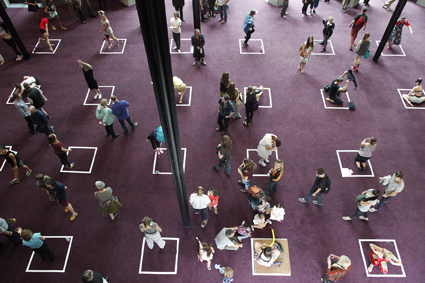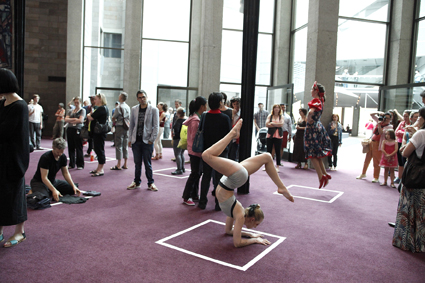quotidian moves, gangnam-style
philipa rothfield: ben speth, wetubelive

WeTubeLIVE, Ben Speth, Dance Massive 2013
photo Rachel Roberts
WeTubeLIVE, Ben Speth, Dance Massive 2013
THE CITATION OF SO-CALLED PEDESTRIAN MOVEMENT IN POSTMODERN DANCE HAS BEEN INTERPRETED IN MANY WAYS, ONE OF WHICH SEES THE USE OF THE QUOTIDIAN IN DANCE AS AN ATTEMPT TO DECONSTRUCT NOTIONS OF VIRTUOSITY AND SPECTACLE.
WeTube LIVE offers another way to rethink the values of dance performance. Where Steve Paxton’s Satisfying Lover (1967) offered a series of ordinary bodies walking, standing and sitting, WeTube LIVE opens up another kind of space, framed in the context of the electronic everyday.
The Great Hall of Victoria’s National Gallery is vast, its Leonard French ceiling a coloured relief from vast walls of grey brick. The room is full of young people, each consumed by a particular activity performed and contained within white squares. The difference between them is marked but they are united through a sense of commitment to their task. The diversity of these performative tasks exists within a score: to source the performance material from YouTube.
The audience flows around the squares, a mass promenade, pausing then moving on at a uniform pace. At a certain point, the performers melt away and line up along the length of the wall. We are now the choreography. They watch us, then the cellular activity begins again and the promenade resumes.
Some performers have selected dance sequences or hip hop, another copied a Beyoncé routine, another executed a makeup ritual. Several performances contained an element of critique, whether through displacement, parody or exaggeration. One young woman performed a charming mittel European folk dance—in costume—another confined himself to a cardboard box.

WeTubeLIVE, Ben Speth, Dance Massive 2013
photo Rachel Roberts
WeTubeLIVE, Ben Speth, Dance Massive 2013
What struck me was the confidence of the group, many of whom are teenagers or young adults, inviting being seen very close up. The close proximity of the viewing experience engenders a certain dialogue between the watcher and performer. I feel that I am meeting these people, encountering something about them which is at the same time mediated.
A great deal of cultural theory suggests that identity comes from outside the self but is solidified through what the body does in a performative sense. In general, this is thought to be an unconscious process. We think and feel our identity as internal and intimate, not the product of social forces. WeTubeLIVE differs on this point, or at least troubles the distinction between outer and inner inasmuch as the range of choices is very much part of popular culture but, once made, the choice becomes a mode of enactive agency.
Viewed through the lens of community dance, WeTubeLIVE is a mode of group participation, individual expression and serial observation. Its form of community is two-fold, formed between those present in the Great Hall but also the virtual community of YouTube watchers. Normally we send each other links. In this instance, the links are a daisy chain of live actions.
The affective impact of WeTubeLIVE was a positive feeling about these young people and their choices. This is different (and complementary) to the darker thoughts explored in many of the Dance Massive pieces, achieved through foregrounding agency and participation rather than critique through representation. In that sense, WeTubeLIVE is a utopian gesture, a mode of agency ‘Gangnam-style.’
–
Dance Massive: WeTubeLIVE, concept, direction Ben Speth, project manager Bec Reid, dance facilitator Adam Wheeler; The Great Hall, National Gallery of Victroria, March 24






